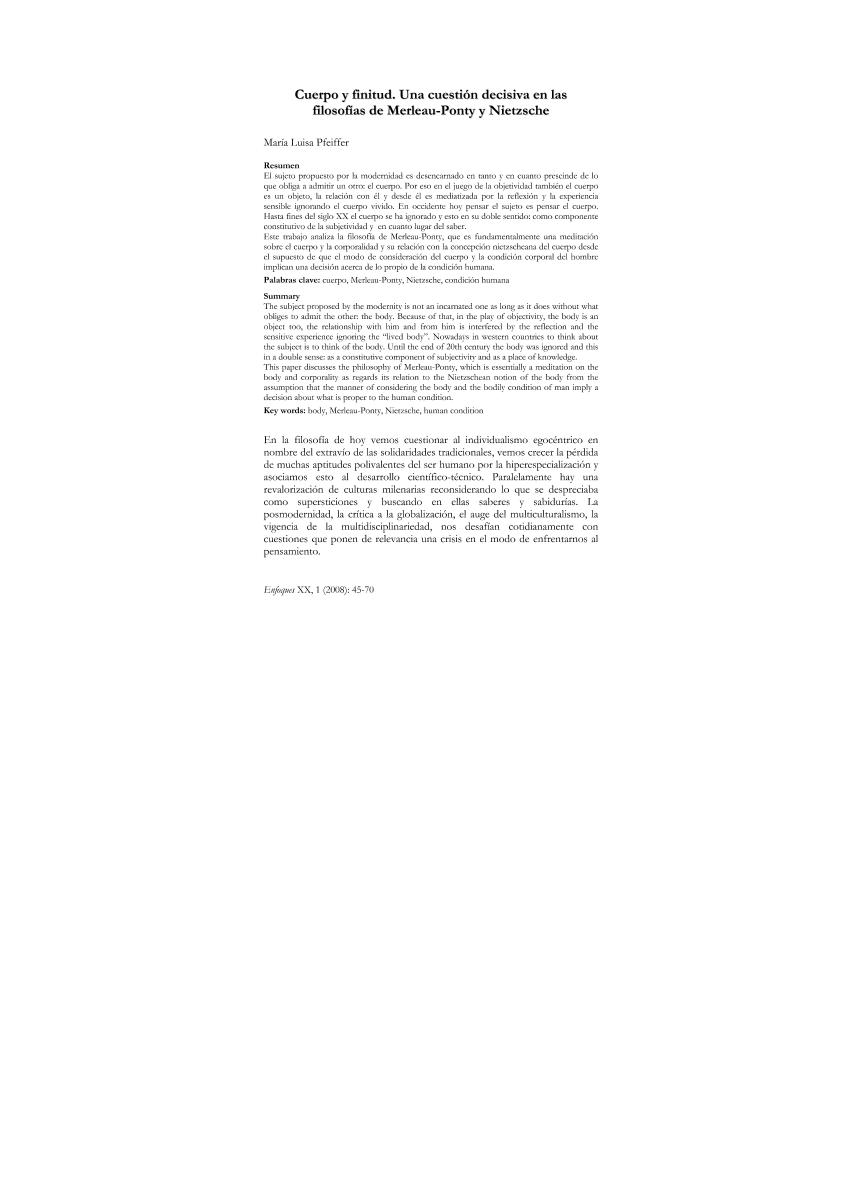Mostrar el registro sencillo del ítem
dc.contributor.author
Pfeiffer, Maria Luisa Cecilia

dc.date.available
2017-04-12T20:26:38Z
dc.date.issued
2008-03
dc.identifier.citation
Pfeiffer, Maria Luisa Cecilia; Cuerpo y finitud. Una cuestión decisiva en las filosofías de Merleau-Ponty y Nietzsche; Universidad Adventista del Plata; Enfoques; 20; 1-2; 3-2008; 47-72
dc.identifier.issn
1514-6006
dc.identifier.uri
http://hdl.handle.net/11336/15256
dc.description.abstract
El sujeto propuesto por la modernidad es desencarnado en tanto y en cuanto prescinde de lo que obliga a admitir un otro: el cuerpo. Por eso en el juego de la objetividad también el cuerpo es un objeto, la relación con él y desde él es mediatizada por la reflexión y la experiencia sensible ignorando el cuerpo vivido. En occidente hoy pensar el sujeto es pensar el cuerpo. Hasta fines del siglo XX el cuerpo se ha ignorado y esto en su doble sentido: como componente constitutivo de la subjetividad y en cuanto lugar del saber. Este trabajo analiza la filosofía de Merleau-Ponty, que es fundamentalmente una meditación sobre el cuerpo y la corporalidad y su relación con la concepción nietzscheana del cuerpo desde el supuesto de que el modo de consideración del cuerpo y la condición corporal del hombre implican una decisión acerca de lo propio de la condición humana.
dc.description.abstract
The subject proposed by the modernity is not an incarnated one as long as it does without what obliges to admit the other: the body. Because of that, in the play of objectivity, the body is an object too, the relationship with him and from him is interfered by the reflection and the sensitive experience ignoring the “lived body”. Nowadays in western countries to think about the subject is to think of the body. Until the end of 20th century the body was ignored and this in adouble sense: as a constitutive component of subjectivity and as a place of knowledge.This paper discusses the philosophy of Merleau-Ponty, which is essentially a meditation on the body and corporality as regards its relation to the Nietzschean notion of the body from the assumption that the manner of considering the body and the bodily condition of man imply a decision about what is proper to the human condition.
dc.format
application/pdf
dc.language.iso
spa
dc.publisher
Universidad Adventista del Plata
dc.rights
info:eu-repo/semantics/openAccess
dc.rights.uri
https://creativecommons.org/licenses/by-nc-sa/2.5/ar/
dc.subject
Cuerpo
dc.subject
Merleau-Ponty
dc.subject
Nietzsche
dc.subject
Condición Humana
dc.subject.classification
Otras Filosofía, Étnica y Religión

dc.subject.classification
Filosofía, Ética y Religión

dc.subject.classification
HUMANIDADES

dc.title
Cuerpo y finitud. Una cuestión decisiva en las filosofías de Merleau-Ponty y Nietzsche
dc.type
info:eu-repo/semantics/article
dc.type
info:ar-repo/semantics/artículo
dc.type
info:eu-repo/semantics/publishedVersion
dc.date.updated
2017-03-21T20:12:18Z
dc.journal.volume
20
dc.journal.number
1-2
dc.journal.pagination
47-72
dc.journal.pais
Argentina

dc.journal.ciudad
Libertador San Martín
dc.description.fil
Fil: Pfeiffer, Maria Luisa Cecilia. Consejo Nacional de Investigaciones Científicas y Técnicas; Argentina
dc.journal.title
Enfoques
dc.relation.alternativeid
info:eu-repo/semantics/altIdentifier/url/http://ref.scielo.org/kcdpgc
dc.relation.alternativeid
info:eu-repo/semantics/altIdentifier/url/https://dialnet.unirioja.es/servlet/articulo?codigo=3263303
dc.relation.alternativeid
info:eu-repo/semantics/altIdentifier/url/http://publicaciones.uap.edu.ar/index.php/revistaenfoques/article/view/243
Archivos asociados
